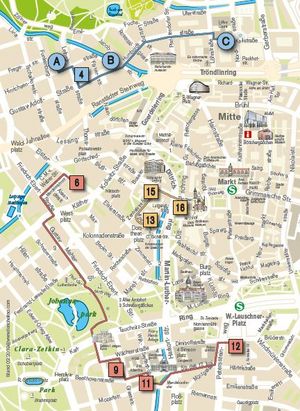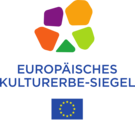On the Trail of Jewish Musicians in Leipzig with the Notenbogen-Entdeckerpass

Two complementary teaching materials for Leipzig elementary schools, high schools, children and adults – the “Notenbogen-Entdeckerpass. Jüdischen Musikern in Leipzig auf der Spur” ("Music Arc Discovery Passport. On the Trail of Jewish Musicians") and “Jüdischen Musikern in Leipzig auf der Spur. Didaktische Materialien” ("On the Trail of Jewish Musicians in Leipzig. Didactic Materials" – made the realisation of our ambitions regarding Jewish musical culture in Leipzig possible (for more information, visit).
In June 2017, the brochure "Notenbogen-Entdeckerpass“ for children aged 8 and up was published as part of the "Jewish Week". It can be used to encourage independent discovery for children and adults, both in lessons at Leipzig schools and independently in a family environment, or on school trips to the city.
The brochure‘s content is divided into three sections: an interactive city tour, musician biographies, and general information about music in Judaism. The Notenbogen Discovery Passport is distributed by Notenspur Leipzig e.V., Leipzig Tourismus und Marketing GmbH, and the Mendelssohn-Haus for a nominal fee of €2.50 and can also be downloaded digitally from the Notenspur Leipzig e.V. homepage (here in German) or borrowed from Leipzig City Library. Our homepage also offers a hands-on gallery and audio samples of the Jewish musicians discussed in the brochure, all of whom had a connection to the city of Leipzig. In addition to the playfully designed Notenbogen Discovery Passport, we regularly organize adventure-oriented interactive events for 4th to 6th graders in cooperation with the Jewish cultural and meeting centre "Ariowitsch-Haus" ("We celebrate, sing, dance"). (See also Children, Families, Schools).
Another component of the project is the publication "Jüdischen Musikern in Leipzig auf der Spur. Didaktische Materialien" (German only) which was prepared in cooperation with the Chair for History Education at the University of Leipzig. These materials are primarily aimed at teachers of history, ethics, religion and music and are recommended for students grade 5 and up. These teaching materials can be used equally by employees at extracurricular places of learning, citizens and visitors to the city of Leipzig. In combination with the Notenbogen Discovery Passport, it is intended to serve as a reference guide and is an integral part of the concept.
The first part contains a quiz to allow learners to acquire knowledge playfully. The second part is dedicated to three thematically different city rallies, which provide participants with the opportunity to further explore what has been learned on the ground. The third part is about discovery and research into the biographies of Jewish musicians with a focus on the political and social circumstances of the time. A public introductory event on April 25th, 2018, as well as an internal training day for teaching staff on March 25th, 2019, were the first measures to publicize and sustainably use the teaching materials in Leipzig's school and non-school educational landscape.
The Notenbogen Discovery Passport and the didactic materials were primarily created in collaboration with volunteers.
Our partners and supporters:
Ariowitsch-Haus e.V.
Dr. Thomas Schinköth
Leipzig University | Dr. Frank Britsche
Elke Urban
Mendelssohn House
Leipzig Tourismus und Marketing GmbH (Leipzig Tourism and Marketing)
Leipziger Synagogalchor (Synagogue Choir Leipzig)
Stadtbibliothek Leipzig (Leipzig City Library)
Villa Leipzig
Student teachers of the subject music
Freie Waldorfschule Berthastraße
Jewish Religious Community of Leipzig
Stadtgeschichtliches Museum Leipzig (Museum of City History Leipzig)
University of Music and Theater „Felix Mendelssohn Bartholdy"
Financial support comes from the Leipzig Institute for Materials Research and Testing, the Leipzig hilft Kindern (Leipzig helps children) foundation and the „Remembrance, Responsibility and Future“ foundation.
The project is funded by the Federal Government Commissioner for Culture and the Media as part of the European Year of Cultural Heritage 2018.
Funded by the Cultural Foundation of the Free State of Saxony. This measure is co-financed by tax funds on the basis of the budget passed by the members of the Saxon state parliament.







